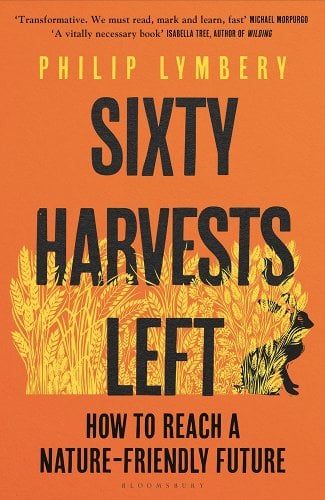
I’ve long believed that the Dust Bowl years were the result of rampant over-farming and generally awful land management. And while this is true, what I didn’t realize until I had read Sixty Harvests Left was that even back then, when the “dusters” were an ever-present threat, there were those in positions of power who suggested that the dirt in the air was just a one-off natural event. That these dusters were not human created. That there was no real need to change the way everyone was farming.
This all sounds eerily familiar, and it is a reminder that those who forget history are doomed to repeat it; in many ways we are doing just that.
But this time around we don’t have a second chance.
Sixty Harvests Left draws its title from a warning from the United Nations, in which the world’s topsoil could be gone in sixty years due to overgrazing, over-fertilizing and over-use.
Author Philip Lymbery, Chief Executive of Compassion in World Farming, takes us with him from his rural home in England to factory farms in the US and Asia and into Brazil, where forests are being decimated to grow soy to meet the worldwide demand for animal agriculture — not food for humans but food for the animals that humans eat.
Lymbery shows us farmers who are doing things the right way. If you’ve heard of regenerative farming you’ll know that there are a growing number of farmers who actively avoid chemicals and rotate crops in intelligent ways and intersperse farmed land with wild land, providing sustenance to pollinators who so desperately need it.
While I generally object to any use of animals in agriculture — it almost always ends badly for the animals — I do admire those bold enough to rethink animal agriculture and cut back on their reliance on animals in favor of growing food for people (instead of growing feed for animals). Lymbery profiles a few farmers who are challenging conventional thinking — and succeeding along the way. It’s not easy going up against Big-Ag. The founding chairman of the Pasture-Fed Livestock Association said, “Bucking a trend is not easy, particularly when many businesses benefit from selling feed, fertilizers and other chemicals to farmers.”
You don’t need animals at all to create healthy farmland. Consider David and Kendra Brandt who have nurtured healthy farmland sans farm animals thanks to “underground livestock” —the fungi and other creatures who create healthy soil.
If we do nothing, if Big-Ag continues to treat the land and animals as it does, if people don’t stop cutting back on their meat consumption, then we could very well have just sixty harvests left.
But if we change our ways — not just farmers but all of us — there is hope.
And perhaps I’m biased, as one of those plant-based people, but I have come a very long way from a person who could not imagine giving up meat. If we’re open to changing our identities, our traditions, then anything is possible.
Fortunately, Lymbery takes us inevitably to a future where meat consumption is replaced by fake meats — plants or cultured meats. And this is perhaps the most important takeaway of the book — that we all have the power, three times a day, to change the world.
By decreasing or eliminating meat and dairy products we cut the demand that is quite literary destroying the planet. I was thrilled to see an environmental book — unlike so many so-called environmental books in the shelves today — tackle the most pressing and most uncomfortable issue for so many people.
Trust me, giving up meat is not nearly as big of a sacrifice as it once was. Try a Beyond Meat or Impossible burger and you’ll see why. Or try Miyoko’s cheese. Or Daiya. The options are growing every day and Lymbery notes that there are more than 70 companies right now working on cultured meat alternatives. I’ve never tried a cultured meat product but I have tried cultured cheese (#myokos) and can recommend it.
There are so many environmental crises all around us to feel helpless and depressed about. And while this book doesn’t shy away from the horrible truths, it also points a way forward, one that promises cleaner air and water, healthier soil, and the saving of billions of animal lives. Provided we’re up to the task.
Sixty Harvests Left
How to Reach a Nature-Friendly Future
Philip Lymbery
Bloomsbury Publishing
John is co-author, with Midge Raymond, of the Tasmanian mystery Devils Island. He is also author of the novels The Tourist Trail and Where Oceans Hide Their Dead. Co-founder of Ashland Creek Press and editor of Writing for Animals (also now a writing program).

